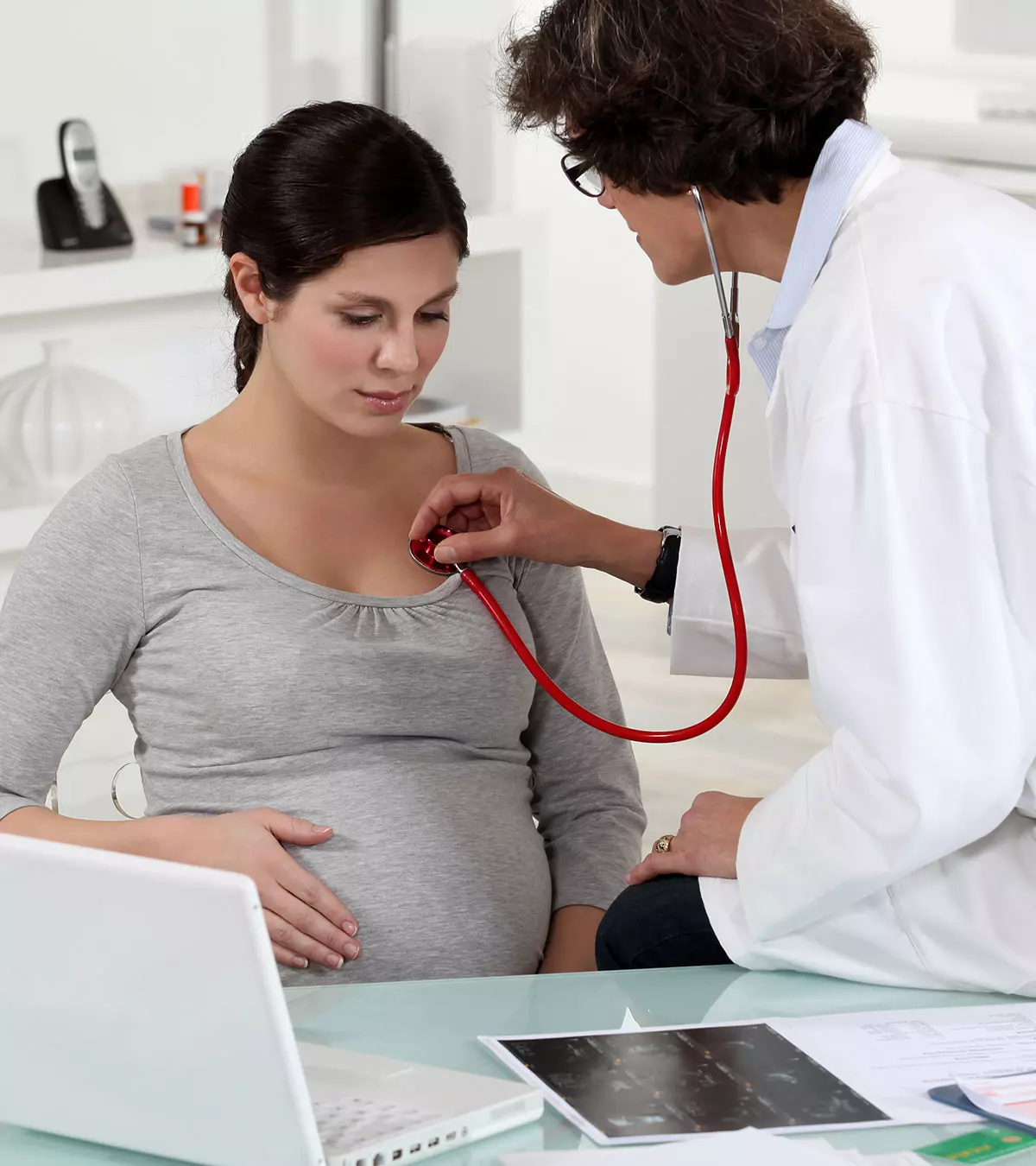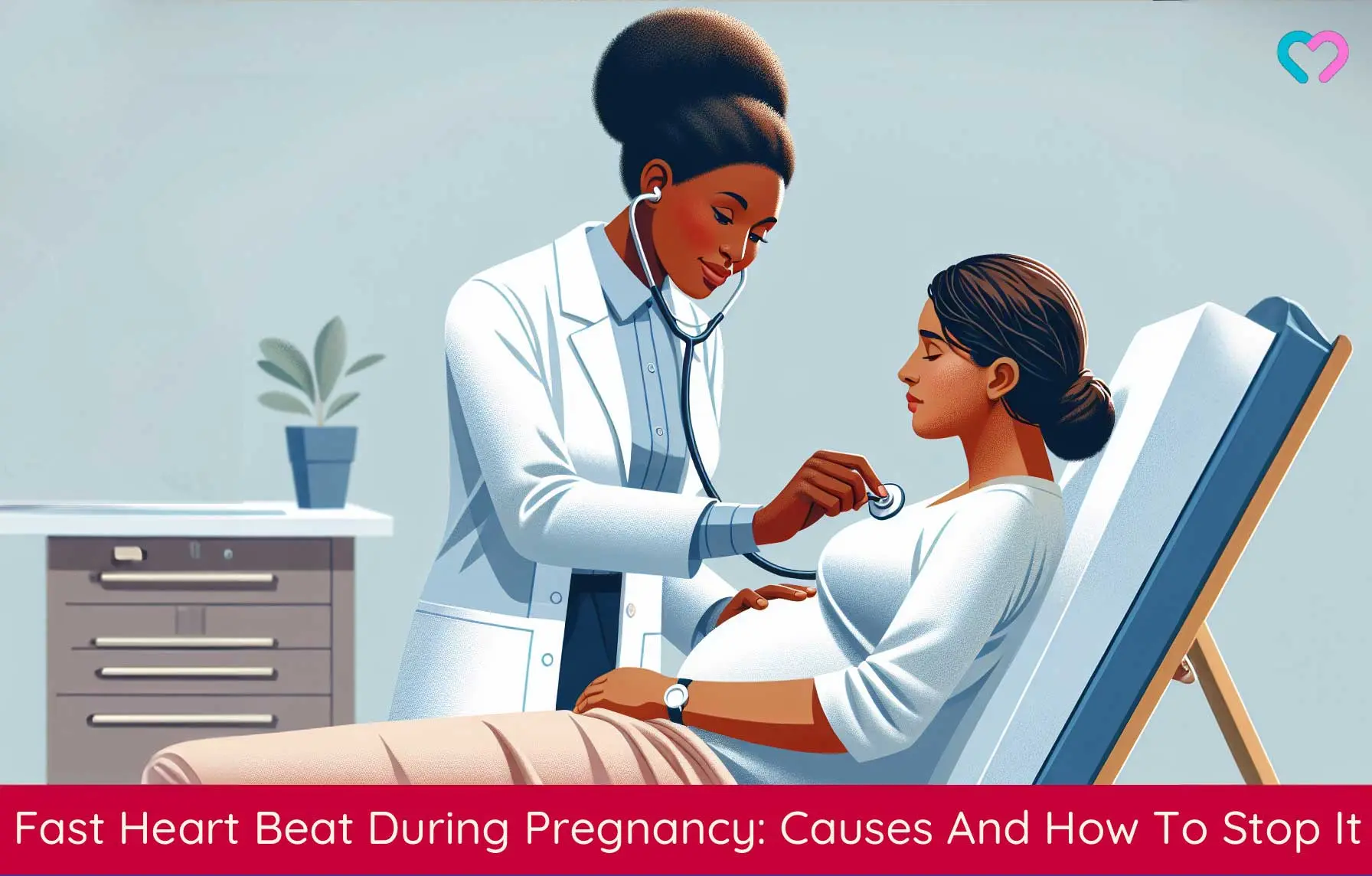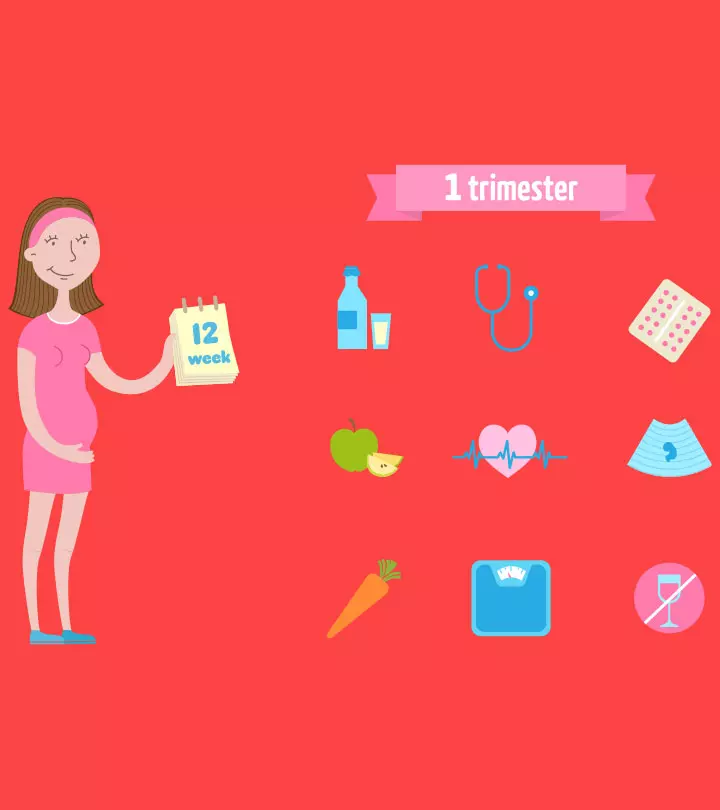
Image: ShutterStock

Key Pointers
- During pregnancy, it’s typical to experience a 25% increase in heart rate due to the heart’s increased demand to circulate more blood.
- Various factors such as altered blood flow, anxiety, uterine expansion, breast changes, medical conditions, or lifestyle choices may contribute to the elevated heart rate.
- Symptoms that may accompany a fast heart rate during pregnancy include shortness of breath, palpitations, dizziness, or fainting.
- Pregnant women can regulate their heart rate by adopting proper sleep and relaxation techniques.
- Although not typically dangerous, if an elevated heart rate occurs frequently and is accompanied by other symptoms, medical advice should be sought.
Is It Normal To Have A High Heart Rate When You Are Pregnant?
Experiencing fast heartbeats during pregnancy is not uncommon. A heart rate reaching up to 100 bpm (beats per minute) or above may be normal for most people. However, during pregnancy, the heart rate may increase by about 25%. This increase in heart rate may cause episodic heart palpitations in pregnant women (1) (2). It is referred to as tachycardiaiHeart rate of more than 100 beats per minute . One may report the symptoms of tachycardia as the feeling of pounding, racing, or fluttering. The heart has to pump more blood to compensate for doing the additional work of nurturing the baby and also providing the newborn with nutrients and oxygen. Other underlying medical conditions may also lead to fast heartbeats in pregnancy.
Dr. Kimberly Langdon, a US-based obstetrician/gynecologist, says, “Palpitations are considered normal if they are not accompanied by chest pain, shortness of breath, fainting, activity limitations, or a resting heart rate of 120 beats per minute (bpm). Circulatory changes caused by increased blood volume and hormones can cause palpitations, but this is not a cause for concern. However, it is prudent to seek medical attention if it occurs frequently or is associated with any of the above symptoms.”
Continue reading this post as we tell you about the causes of fast heartbeats when pregnant and how to manage the condition.
Causes Of High Heart Rate During Pregnancy
In addition to the physiological factors, several other possible aspects can cause increased heart rate during early pregnancy. Some of them include:
- Changes in heart and blood flow: Your uterus requires more blood to supply enough oxygen and nutrients for the baby’s growth and development. As a result, your heart pumps around 30 to 50% more blood than usual (3). Therefore, the normal heartbeat, which is 60bpm to 80bpm, increases by 10bpm to 20bpm throughout pregnancy, and reaches the maximum around the third trimester (4).
- Anxiety: It is normal to worry about your baby and your safety during delivery, and about the overall responsibility of carrying another life. Anxiety and stress during pregnancy might cause an increased heartbeat (5).

- Changes in the uterus size: The uterus increases in size to hold the growing fetus, and requires more blood supply for it (6). This leads to the heart working or beating more than usual to pump the extra blood to the uterus.
- Changing breasts: The mammary glands start to function while you are still pregnant and prepare the body for breastfeeding. As the breasts expand and the tissues enlarge, the mammary blood flow also increases, which means the heart has to pump more blood than usual (7).
- Medical conditions: Thyroid disorders (8), anemia (9), preeclampsiaiComplication of pregnancy indicated by high blood pressure after the 20th week of pregnancy. (10), and heart issues such as coronary heart disease and pulmonary hypertension (high blood pressure affecting the heart and the lungs) could also stimulate heartbeat during pregnancy (11).
- Other pregnancy effects: Weight gain, hormonal changes, and side effects of pregnancy medications may exert strain on the circulatory or cardiovascular system, causing increased heart rate.
- Lifestyle factors: Cigarette smoking, alcohol abuse, exercise, and over-consumption of caffeine might also increase the heart rate.
 Experts say
Experts say
Symptoms Of Fast Heartbeat In Pregnant Women

A fast heartbeat during pregnancy is accompanied by many other symptoms including (1);
- Shortness of breath
- Skipped heartbeats or palpitations
- Dizziness or lightheadedness
- Episodes of fainting
If you experience these symptoms frequently, seek your doctor’s help. Your doctor will examine you thoroughly to check if they are regular pregnancy changes or not.
Jennifer discusses her palpitation experience in her 35th-week pregnancy vlog, “My heart palpitations are still there, and they’re worsening steadily, which brings me to the events of the past week. I was attending my routine non-stress test, which I have every week. During the test, I coincidentally had intense heart palpitations. I mentioned this to the nurse and said I could monitor them myself. She seemed somewhat confused and replied that self-monitoring wasn’t sufficient and that I needed an EKG.
“We promptly contacted my doctor, who ordered an EKG, which confirmed the presence of an irregular heart rhythm. It was concerning but reassuring as it validated my experience of heart palpitations. As they (the healthcare team) picked up an irregular heart rhythm, they sent me home with a heart monitor (i)“.
Symptoms may vary widely among pregnant women. Some may notice mild palpitations, while others might experience stronger sensations. Your fitness level, mental state, and overall health can significantly affect the symptoms’ severity and frequency.
How Fast Is The Heartbeat Throughout The Pregnancy?
The heart’s functioning varies according to the trimesters, which also affects the heartbeat. The heart rate starts to increase from the 7th week, and it peaks by 10 – 20% by the third trimester.
The stroke volume (amount of blood pumped from the heart) increases by 10% in the first half of pregnancy and reaches its peak around 20 weeks, and will remain stable until term (12).
Is Fast Heartbeat During Pregnancy Harmful?
For the most part, an accelerated heart rate is a sign of a healthy pregnancy. It shows that your body is working correctly to meet the demand for oxygen and nutrients needed by the developing baby. As long as other harmful symptoms do not accompany a rapid heartbeat, it may not be a concern.
Dr. Langdon opines, “During pregnancy, women with known heart disease are more likely to experience pathological irregular heart rhythm (arrhythmia). Palpitations would be one of the symptoms. Adverse fetal outcomes, such as pretermiA premature birth occurring before the 37th week of pregnancy. births, low-birth weight, and lung problems, can result from the persistence of this cardiac pathology.”
How To Deal With Fast Heart Rate During Pregnancy?

Although an increased heartbeat is a normal physiological process during pregnancy, it is important to make certain lifestyle changes to support a good fetal and maternal health.
- Try to stay calm and beat stress by occasional intake of chamomile tea or aromatherapyiUsage of essential oils for therapeutic benefits. .
- Get enough sleep at night regularly, ensure it is undisturbed.
- Practice relaxation techniques, such as yoga, deep breathing, and meditation.
- Adopt a balanced diet and engage in regular exercise suitable for pregnancy.
- Avoid excess intake of caffeine.
 Did you know?
Did you know?- Drink enough water to remain well-hydrated.
Medical Treatment For Fast Heart Rate

Medications are not always the best line of treatment for accelerated heart rate and are only used in an emergency, under a doctor’s supervision. Anti-arrhythmiciMedicines prescribed for suppressing abnormal heart rhythms or beta or calcium channel blockers are commonly prescribed for tachycardia (heart rate more than normal) (13).
Next, we answer a few commonly asked questions about accelerated heartbeat during pregnancy.
Frequently Asked Questions
1. How high can my heart rate go when I am pregnant?
The American College of Obstetrics and Gynecology (ACOG) guidelines do not restrict any maximum specific heart rate to adhere to during pregnancy. It is usual to achieve a heart rate beyond 140 bpm during aerobic exercise. (14).
2. Does fast heart rate indicate a boy or girl?
No studies suggest that the maternal heart rate or the fetal heart rate in pregnancy indicates the gender of the fetus. It is only an old wives’ tale that a fetal heart rate above 140 bpm might indicate a girl, and below that indicates a boy (15).
3. Can increased heart rate affect the baby?
Increased heart rate is a healthy change during pregnancy and is not known to affect fetal health adversely.
4. What is the outlook for people with heart palpitations during pregnancy?
“Palpitations are considered normal in pregnancy based on several factors. Pregnant women who experience palpitations and have pre-existing medical conditions such as hyperthyroidismiExcess production of thyroxine hormone resulting in rapid metabolism, weight loss, hand tremors, and irregular heartbeat. , heart disease, or anxiety disorders should seek medical attention. The prognosis in these cases is determined by the current state of heart function and the severity of the underlying condition,” suggests Dr. Langdon.
5. How is a fast heartbeat during pregnancy diagnosed and monitored?
Palpitations or increased heartbeat during early pregnancy is not an uncommon phenomenon. Increased blood flow, stress, lifestyle modifications, and other pregnancy-related factors could lead to an increase in heart rate while pregnant. Though an increased heart rate in pregnant women is harmless to the unborn baby, you must report this condition to your doctor, especially if it is associated with other symptoms such as breathing difficulties and dizziness during pregnancy. Also, ensure you take sufficient rest, a healthy diet, avoid stress and stay hydrated to cope with this situation.
Infographic: When To Seek Medical Care For Fast Heart Rates In Pregnancy?
Timely diagnosis and treatment of underlying heart issues in pregnancy prevent the development of complications such as heart failure. Go through the infographic to know indications to seek medical care for fast heart rates in pregnancy.
Some thing wrong with infographic shortcode. please verify shortcode syntax
Illustration: Fast Heart Beat During Pregnancy Causes And How To Stop It

Image: Dall·E/MomJunction Design Team
Pregnant and worried about your heart rate? Find out if it’s normal to have a high heart rate during pregnancy in this informative video.
Personal Experience: Source
MomJunction articles include first-hand experiences to provide you with better insights through real-life narratives. Here are the sources of personal accounts referenced in this article.
i. Scary heart palpitations | 35 week pregnancy update 2025;https://www.youtube.com/watch?v=XEeF0o_PZzc&feature=youtu.be
References
1. How’s your heart rate and why it matters?; Harvard Health Publishing (2018)
2. Farida M. Jeejeebhoy et al.; Cardiac Arrest in Pregnancy; American Heart Association (2018)
3. Monika Sanghavi & John D. Rutherford; Cardiovascular Physiology of Pregnancy; American Heart Association (AHA) Journals (2014)
4. Roberta Anniverno et al.; Anxiety Disorders in Pregnancy and the Postpartum Period; Open access peer-reviewed chapter (2012)
5. Michael E. Hall, Eric M. George,b and Joey P. Grangerb; The Heart During Pregnancy; NCBI(2013)
6. Antônio Arildo Reginaldo de Holanda et al.; Ultrasound findings of the physiological changes and most common breast diseases during pregnancy and lactation*; Radiol Bras (2016)
7. Thyroid Disease & Pregnancy; National Institute of Diabetes and Digestive and Kidney Diseases (NIDDK)
8. Anemia in Pregnancy; University of Rochester Medical Center (2018)
9. Ekholm EM et al.; Heart rate and blood pressure variabilities are increased in pregnancy-induced hypertension; Am J Obstet Gynecol (1997)
10. Aikaterini Chamaidi et al.; Heart Disease and Pregnancy; Hellenic Journal of Cardiology (2006)
11. Dawn L Adamson and Catherine Nelson‐Piercy; Managing palpitations and arrhythmias during pregnancy; British Medical Journal
12. Raul Artal-Mittelmark; Physical Changes During Pregnancy; MSD Manuals
13. Shantanu Deshpande et al.; Beta-blockers: Are they useful in arrhythmias; SUPPLEMENT OF JAPI (2009)
14. Pauline L. Entin et al.; Recommendations Regarding Exercise During Pregnancy Made by Private/Small Group Practice Obstetricians in the USA ; Journal of Sports Science and Medicine (2006)
15. Hope Ricciotti; Your mom was right: “Morning sickness” means a lower chance of miscarriage: Harvard Health Publishing logo (2016)
16. How much coffee can I drink while I’m pregnant?; The American College of Obstetricians and Gynecologists
17. Mindfulness-Based Interventions During Pregnancy; a Systematic Review and Meta-analysis; NCBI
18. Felicity Coad and Charlotte Frise;Tachycardia in pregnancy: when to worry?; NCBI (2025)
Community Experiences
Join the conversation and become a part of our nurturing community! Share your stories, experiences, and insights to connect with fellow parents.
Read full bio of Dr. Anita Gondy
- Dr. Kimberly Langdon is a gynecologist with 19 years of experience wherein she delivered more than 2,000 babies. She is currently working as vice-president, product development and research at Physician Integrative Laboratories in the US. She did her doctor of medicine from the Ohio State University.
 Dr. Kimberly Langdon is a gynecologist with 19 years of experience wherein she delivered more than 2,000 babies. She is currently working as vice-president, product development and research at Physician Integrative Laboratories in the US. She did her doctor of medicine from the Ohio State University.
Dr. Kimberly Langdon is a gynecologist with 19 years of experience wherein she delivered more than 2,000 babies. She is currently working as vice-president, product development and research at Physician Integrative Laboratories in the US. She did her doctor of medicine from the Ohio State University.
Read full bio of Rebecca Malachi
Read full bio of Dr. Ritika Shah
Read full bio of Reshmi Das

















